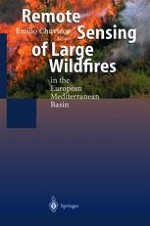1999 | OriginalPaper | Buchkapitel
The role of fire in European Mediterranean ecosystems
verfasst von : Juli G. Pausas, V. Ramón Vallejo
Erschienen in: Remote Sensing of Large Wildfires
Verlag: Springer Berlin Heidelberg
Enthalten in: Professional Book Archive
Aktivieren Sie unsere intelligente Suche, um passende Fachinhalte oder Patente zu finden.
Wählen Sie Textabschnitte aus um mit Künstlicher Intelligenz passenden Patente zu finden. powered by
Markieren Sie Textabschnitte, um KI-gestützt weitere passende Inhalte zu finden. powered by
Fire is an integral part of many ecosystems, including the Mediterranean ones. However, in recent decades the general trend in number of fires and surface burnt in European Mediterranean areas has increased spectacularly. This increase is due to: (a) land-use changes (rural depopulation is increasing land abandonment and consequently, fuel accumulation); and (b) climatic warming (which is reducing fuel humidity and increasing fire risk and fire spread). The main effects of fire on soils are: loss of nutrients during burning and increased risk of erosion after burning. The latter is in fact related to the regeneration traits of the previous vegetation and to the environmental conditions. The principal regeneration traits of plants are: capacity to resprout after fire and fire stimulation of the establishment of new individuals. These two traits give a possible combination of four functional types from the point of view of regeneration after fire, and different relative proportions of these plant types may determine the post-fire regeneration and erosion risk. Field observations in Spain show better regeneration in limestone bedrock type than in marls, and in north-facing slopes than in south-facing ones. Models of vegetation dynamics can be built from the knowledge of plant traits and may help us in predicting post-fire vegetation and long-term vegetation changes under recurrent fires.
